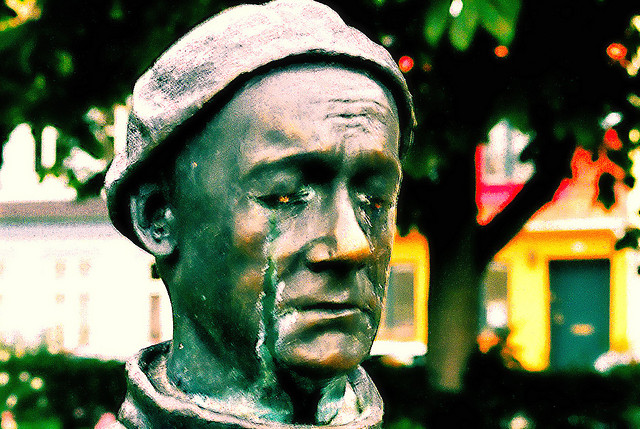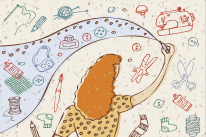
“Our sorrows and wounds are healed only when we touch them with compassion.” ~Buddha
He had been ignoring the symptoms for months, possibly even a year. When my husband came home from the doctors, he told me his PSA score was high, and he needed to have a biopsy. That date came and went, and we were waiting for the pathology report.
The doctor assured us it was nothing.
The image of standing in the car dealership parking lot, talking with my son and son-in-law will be forever etched in my memory. When the phone rang, I saw that it was he, and expecting it to be good news that I could share with my family, I answered it quickly.
These were the words that I heard: “It’s not good; I have cancer.”
Still holding the phone to my ear, I looked at my son. A million thoughts were racing through my mind. Should I tell him? I felt the weight of my husband’s words pressing me into the pavement.
My son and son-in-law were carrying on their conversation as if the world had not stopped. In my mind, it had. How surreal.
As I lowered the phone to my side, and I said, “Dad has cancer.” From that moment on, life as I knew it changed. I am well acquainted with the definition of sadness.
“Sadness is emotional pain associated with, or characterized by feelings of disadvantage, loss, despair, hopelessness, and sorrow. An individual experiencing sadness may become quiet or lethargic, and withdraw themselves from others. Crying is often an indication of sadness.” ~Wikipedia
Over the past three years I have had to make multiple adjustments to the story I had envisioned for my life.
I have a beautiful mobile with birds carved out of driftwood. It was as if someone had flicked one of the birds, sending the others (still tethered together) flying in all directions.
Just as the birds seemed to settle down, they got flicked again, and then again, and then again.
Did you know grief is an actual physical process that our brain goes through after a significant change?
The limbic system in our brain holds an internal image of life as we know it. When a major change takes place, new neuropathways must be built in order to accommodate an updated version of reality.
Building a new picture literally takes a lot of energy and time depending on the nature of the change.
If we didn’t understand that grieving is a necessary process in order to move forward, we might become impatient and want to skip this unpleasant period of time.
Numbness, shock, feeling unsettled, and sadness are among the symptoms of grief.
Out of the hundreds of emotions we experience, sadness is one of the basics.
From a survival perspective, it has been said that sadness was hardwired into us to keep us safe after significant loss. It is associated with a feeling of heaviness, sleepiness, and withdrawal from activity and social connections.
That makes perfect sense when you consider that grief (or the time your brain is updating) causes impaired short-term memory, decreased concentration and attention span, absent-mindedness, forgetfulness, and distraction.
After a major loss it would be unsafe to go hunting or gathering.
Having said that, sadness remains the one emotion people try to avoid the most, and understandably so. To be sad is to be vulnerable, and again, from a primitive perspective, this is a threat to our very survival.
We need to remind ourselves that our minds have evolved, and though it is unpleasant, we can survive sadness. Not only can we survive sadness, it can be our teacher if we let it.
It is impossible to think of any benefit of sadness while in the midst of it, but pondering it before the fact can go a long way in lessening the blow when it occurs. Understanding is powerful.
We can’t make sadness feel good, but we can navigate it better and even learn from it.
What Can Be Learned from Sadness?
- Sadness can help clarify our identity by showing us what we value.
- If we are mindful of the visceral sensations of sadness, we become aware it is an emotion; it’s not who we are.
- It is a signal that we are processing something we don’t want to let go of. We can explore our attachments from a non-judgmental stance.
- As we become acquainted with sadness, we are able to have empathy for others, which strengthens our connections.
- We are better able to appreciate the good times when we have something to contrast it with.
- When we have the courage to handle sadness, we expand our capacity to handle other hard things.
- When we honor our sadness, we learn that passing through it is expedited.
“Getting over a painful experience is much like crossing monkey bars. You have to let go at some point in order to move forward.” ~C. S. Lewis
Navigating Sadness
1. Identify the source of your sadness.
Emotions have more power when their triggers are kept secret. Name what is making you sad. It doesn’t have to be one thing.
2. Determine if it is justified.
Do yourself a favor and ask if what your sad about is true. If it is not, let it go. Usually if you are sad it is legitimate, even if the reason isn’t what you thought it was to begin with.
3. Validate your emotion.
Allow yourself to feel sad. What you are feeling is real.
4. Practice self-compassion.
Show yourself some love. Don’t be angry with yourself. In Tara Brach’s words say, “It’s okay, sweetheart.”
5. Accept.
Unconditionally accept your new reality. You don’t have to like it, approve of it, or give life a pass. Acceptance allows you to manage change more effectively.
6. Create a survivor’s picture.
Paint a new picture of your life with you being a courageous survivor. Find the meaning in your suffering.
7. Remember that every day deserves a new picture.
Stay in the here and now, and allow a new picture to unfold each day. When you are flexible enough to allow for small changes regularly, big changes, though shocking, are easier to handle.
—
Navigating rather than running from sadness has deepened my perspective on life. It has helped me savor time with loved ones, be more compassionate with others who might be struggling, and not become unsettled over small things.
It has taught me that I have little control over what comes to pass in my life, but I have courage to pass through hard times, knowing the sun will shine again, if I allow it.
Most of all, I have learned that time and being compassionate toward myself are the most reliable healers.
I can feel vulnerable and still know I will survive.
Disclaimer: This article is in reference to non-depressive sadness. If you have been excessively sad for an extended period of time for no apparent reason, please seek professional help.
Photo by Anders Ljungberg
About Barbara Scoville
Barbara Scoville is a licensed clinical social worker practicing psychotherapy in Salt Lake City, Utah. She is passionate about cultivating resilience and combines both Eastern and Western Philosophy into her practice. Check out her blog at www.barbarascovillelcsw.com for an eclectic boost of wisdom and encouragement.













 Though I run this site, it is not mine. It's ours. It's not about me. It's about us. Your stories and your wisdom are just as meaningful as mine.
Though I run this site, it is not mine. It's ours. It's not about me. It's about us. Your stories and your wisdom are just as meaningful as mine.
I thank you for this post.
Great post~
When people try not to cry they close their lips and swallow- swallow the emotion which then builds up inside them. Allowing oneself to feel emotion and cry let’s the emotion be released so it doesn’t have to build up inside and create more havoc down the road. When emotion becomes free it allows space that can then be replaced with good and happiness, even in times of sorrow and hardship.
nicely written Barbara!!
Barbara- well written- We all experience sad events in our life and nobody shouldn’t expect that it would not come in their lifetime. We need to take sadness a part of our life events and make sure we learn from them and be stronger and when life will throw not so good events, may be we are strong enough to handle them and let go and move on with our life. Easy to say, but would like to move in this direction.
“When a major change takes place, new neuropathways must be built in order to accommodate an updated version of reality. Building a new picture literally takes a lot of energy and time depending on the nature of the change.” This explains a lot to me, as I struggle to recover from the ending of a 25+ year relationship. It seems to take a tremendous amount of energy just to get up and live every single day. I feel like I’m doing a lot of the right things to get through, but it’s still very difficult every day.
I just recently learned what it feels like to actually feel grief and the sadness it brings. I thought I was feeling it after the deaths of family members and friends, but I was shoving it. When it finally broke through it opened my heart to discover a reality I didn’t think I would find this lifetime. I like how you write about how the brain has to “make new neuropathways to accommodate the new version of reality” and the energy it takes to do this. Thank you!
Lovely — I deeply appreciate the looking into the triggers for sadness in order to understand the nature of the emotion better.
I also highly recommend reading Martin Prechtel on the nature of grief. He talks about it as actually being synonymous in a way with praise, in that through grief we praise the thing we lost, which in life was the thing we loved — and the amount of grief most naturally follows the amount of love we felt for what we lost.
A beautiful topic — thank you for sharing!
How To Stop A Divorce And Save Your Marriage?
My name is Nakita Shelton,am from California in USA.i want to use this opportunity to thank my great doctor who really made my life a pleasurable one today. This great man Dr.Brave brought my husband back to me, i had three lovely kids for my husband, about four years ago i and my husband has been into one qaurrel or the other until he finally left me for one lady. i felt my life was over and my kids thought they would never see their father again. i tried to be stronge just for the kids but i could not control the pains that torments my heart, my heart was filled with sorrows and pains because i was really in love with my husband. Every day and night i think of him and always wish he would come back to me, until one day i met a good friend of mine that was also in a situation like me but her problem was her ex-boyfriend who she had an unwanted pregnancy for and he refused to take responsibility and dumped her. she told me that mine was a small case and that i should not worry about it at all, so i asked her what was the solution to my problems and she gave me this great man email address. i was doubting if this man was the solution, so i contacted this great man and he told me what to do and i deed them all, he told me to wait for just two day and that my husband will come crawlling on his kneels just for forgiveness so i faithfully deed what this great man asked me to do and for sure after two days i heard a knock on the door, in a great suprise i saw him on his kneels and i was speechless, when he saw me, all he did was crying and asking me for forgiveness, from that day, all the pains and sorrows in my heart flew away,since then i and my husband and our lovely kids are happy.thats why i want to say a big thank you to Dr.Brave. This great man made me to understand that there is no problem on earth that has no solution so please if you know that you have this same problem or any problem that is similar, i will advise you to come straight to this great man. you can email him at:bravespellcaster@gmail.com CONTACT HIM NOW FOR SOLUTION TO ALL YOUR PROBLEMS.